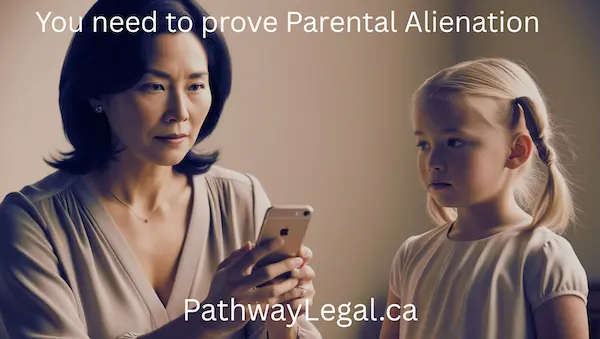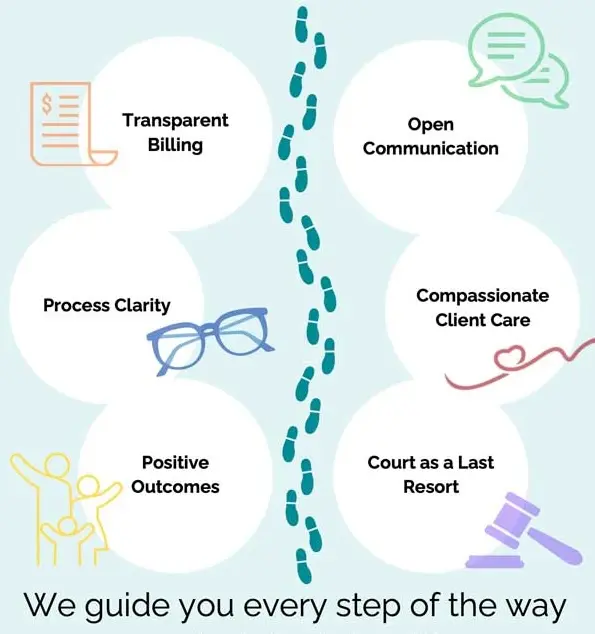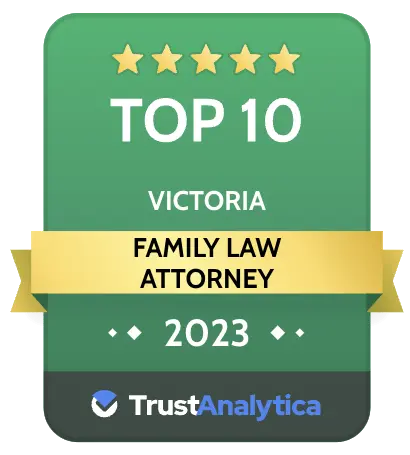Discover more. If your divorce is inevitable, choose the BETTER Path: join our newsletter for supportive, resolution-focused information!

How to Prove Parental Alienation in Court
- Home
- Parental Alienation
- Proving Parental Alienation
How Can I Start To Prove Parental Alienation in Court in BC?
At Pathway Legal, we strongly recommend you talk with your lawyer before initiating parental alienation legal action. You will want to start by consulting with a parental alienation lawyer who is familiar with and experienced in proving parental alienation syndrome in court.
Proving parental alienation in court is not easy.
As family law lawyers, at Pathway Legal we always try to resolve matters by moving towards an amicable divorce for our clients. However, this is not always possible. We have certainly seen our share of high-conflict custody battles.
Quick Links
It is significant and important to know that high-conflict custody battles are the longest, hardest, most difficult, most exhausting, and yes, the most expensive of cases we manage. All seem to have the common element of alienation of parental rights by at least one parent against the other. It is worth knowing that parental alienation is also referred to as the alienation of parental affection. Whatever you call it, it is a form of child abuse and if you are considering parental alienation legal action, then you will need to work closely with your family law lawyer and compile thorough evidence.
In fact, our longest case ended up as a parental alienation legal action. It began when a client met us at the courthouse because they were looking for the best child custody lawyer they could find. Little did we, as family law lawyers, or the client, know that we would end up working together for more than 10 years!
In that particular case, one parent had a significant personality disorder that resulted in narcissistic parental alienation. It was a tough and all-consuming matter to deal with, not only for our client but also for us as parental alienation lawyers.
Making a mistake and saying the wrong thing does not create parental alienation
Suing for parental alienation
Before suing for parental alienation in British Columbia (BC), you want to be more than just a little bit convinced that you are being unfairly and wrongly deprived of having a meaningful relationship with your kids due to (mostly) deliberate actions or influence of your child’s other parent. In order for it to be parental alienation, it must be a systematic campaign, not just a comment made once or twice.
Because the BC Family Law Act focuses that parenting arrangements must always be in the best interests of a child, it also recognizes the fundamental importance of a child having a relationship with both parents. If a parent is trying to turn their child against the other parent, that is not in the child’s best interest.
The end result and goal is that your children will have the opportunity to have a meaningful and healthy relationship with both of you and, if possible, the negative impact of parental alienation abuse is minimized or eliminated.
What role does the judge play in parental alienation cases?

In a parental alienation legal action a judge’s view on parental alienation will be critical. If a parent wants to know how to lose custody, parental alienation will do it.
As parental alienation lawyers, we have noticed that most of the time, judges will give a party a chance to correct their behaviour.
Once the parent is advised that parental alienation abuse hurts their child, the court will give that parent a chance to parent in a healthier manner.
In the long-term case we had, the parent did not correct their behaviour and the parent lost all contact with the child. It was because the parental alienation abuse was so severe that the father lost his entitlement to have a relationship with his child, and despite it all, and because of his narcissistic parental alienation tactics, he never could or would accept responsibility for his actions.
Need a Deep Dive?
- We address how the law in British Columbia deals with parental alienation in extensive detail.
- Unsure whether you are experiencing alienation? Use our detailed list of examples as a guide.
How to Prove Parental Alienation in Court
Starting a parental alienation legal action is a serious undertaking and proving your case in court is not easy to do. Make sure you have evidence to back up what you are saying. It takes documentary evidence to prove what is happening and this section outlines how to document parental alienation for the family court.
1. Document everything! Write down and record all signs of parental alienation
Write down all the signs of parental alienation.
For example, if your child says something that leads you to believe that they are being exposed to alienating behaviours from the other parent, WRITE it down right away.
Have a notebook/Google document or Word document where you have written down absolutely everything that was said.
This does not mean that you want to be questioning your child about what goes on in the other household either!
This is because that action is an alienating behaviour by you against the other parent! But if something comes out of the mouth of your child and it looks like evidence of parental alienation, write it down.
In one case there was parental alienation accusation against the mother, where the father had insisted that the child write down and report back to him everything (and I mean everything) that happened in his mother’s home. The father also bribed the kid by paying him to do all of his homework during the mother’s parenting time so the child would not be doing homework during his parenting time.
Remember, even if you think you will never forget it, write it down anyway, with the date and time your child said it.
Parental alienation in court is proven by written accounts. It is also proven by texts, emails, and other documentation.
2. How can I document parental alienation?
You know the old saying that a picture is worth more than 1000 words? It is particularly true if you are collecting evidence for a case to prove parental alienation in court. Material that will support your case is often accumulated with documentary evidence.
A good lawyer will tell you that you can discreetly document what is happening if you suspect that your children (and you) may be at the effect of it. Here are some powerful examples:
Video
In our parent alienation examples page I describe a situation where the father discreetly recorded the pick up of his 5 year old son from the mother’s home for his parenting time. If we had not seen the video recording, we would not have believed what we saw.
The mother, who genuinely loved their son (as did the Dad) was sobbing as she was getting the child ready to go. She was telling the child to “Make sure your Dad feeds you enough food,” “Make sure your Dad zips up your jacket,” and “Make sure you stay safe while with your Dad.” What the mother did not see at all was that she was clearly engaging in alienating behaviour.
We outline how this issue was resolved with a child custody agreement, below.
Photographs
Photograph every bump and bruise. Document any that may hurt, have required medical attention. Keep a record of the consistency and timings of the events and photos.
Social media posts
If you are aware of social media posts that attack you, your family or anyone related to a matter, document it, tell your lawyer and always take screenshots with the time and date.
We had a father that was warned by a court that the legal consequences of his alienating behaviour were serious and that he must stop immediately if he wanted to continue a relationship with his son. Despite this, the father continued to utilize social media posts because he knew his son would see them.
Text messages
Never delete text messages. For example, we had a case at Pathway Legal where we proved parental alienation in court on behalf of the father. In this matter, the mum had been over-sending the child messages during the father's parenting time. The child was continuously being interrupted by the mother with excessive texts during the father’s parenting time.
Parental alienation phone calls
The phone is an obvious potential tool for parental alienation abuse.
In one case at Pathway Legal, the alienating parent would phone the child just before bed each night, specifically to disrupt their nighttime routine. They would get the child excited and wound up so the parent who had parenting time could not get the child to settle and to sleep.
Denying child access to the phone
The alternative use (or misuse) of the phone is when a child is not allowed to call or supported to call (if they are young) their other parent while in the other parent’s care.
In one case, the child was told by the father, “When you are in our house, your mother does not exist.” Unfortunately for the child, this is a dramatic demonstration of parental alienation syndrome.
Emails
We had one case where there was parental alienation against the mother. Every time she advised the Dad of any medical appointments for their child (as she was required to do), the father would use her email as an opportunity to unleash tirades of abuse and insults at her.
All of this documentary evidence supported her proving parental alienation in court.
3. Record your own, your
family’s, and your friends’ experiences
As a parent, what you say can be important in court.
Sometimes parents don’t realize that they can prove parental alienation by telling the court what they have experienced.
For example, you may have friends or family members who have also witnessed the parental alienation abuse that you have experienced. A judge's view can come down to evidence from credible witnesses, including you, your friends and close family members. So always remember to document their experiences. Ensure anything you record is factual.
4. Consult with a parental alienation lawyer in BC
A parental alienation lawyer will have the necessary experience and understanding of this relatively complex area of the law.
Suing for parental alienation should not be done lightly. The Pathway Legal Team includes family law lawyers experienced in parental alienation matters. If you believe there is a case to be made you need to be very sure you have clear, uncontaminated evidence that you can rely on. One of our Pathway Lawyers will be able to help you with this.
For example, in one case, the father was accusing the mother of parental alienation against father. He accused the mother of maternal gatekeeping, that is, he accused her of limiting his role in the child’s life because of her controlling nature.
Ironically, the father had a narcissistic personality disorder and could not at all understand why his ongoing and relentless campaign to denigrate and malign the mother to the child was hurting their child.
Because the parties had already been involved in a high-conflict custody battle, the mother did not relish the idea of returning to the courtroom. However, in this case, the parental alienation abuse was so severe, that she had no choice.
Ultimately, the judge's view on parental alienation prevailed and the child was protected from further psychological damage. In this case the mother sought the advice of a parental alienation lawyer because she wanted to ensure that she would know how to prove parental alienation and how to document parental alienation in a way that the court would understand her legitimate concerns.
5. Engage other professionals
The BC Family Law Act requires that unless it is inappropriate to do so, a child’s views must be taken into account. Engaging other professionals such as a child counsellor or psychologist will support you in ensuring their wishes are taken into the court and professionally presented to the court.
If a child’s view shows signs of parental alienation, a professional will likely be able to assist with documenting and proving it.
Using a Child Custody Agreement Without Court to Resolve Parental Alienation
Working with a family law lawyer who is experienced in dealing with parental alienation, it is quite possible to resolve an issue with a child custody agreement, without court appearances.
For example, in the case above where the mother was sobbing in front of the child we reached a child custody agreement without court with the following strategy
- We reached an agreement at child custody mediation whereby the mother was required to bring the child to school on school days (unless the child was ill). Before the mediation the mother often kept the child at home, causing him to miss many days of school;
- We arranged that the pickup and drop off of the child would occur at his school, that way we were able to avoid the high conflict custody exchange that was unfolding each and every time the father picked the child up from the mother’s house (the little kid was put in the middle of conflict because he was sad for his crying mother); and
- We substantially increased the father’s parenting time with the child. In that case, the mother believed she was the only suitable parent for the child. Even though the mother hired a law firm known for representing mothers in child custody cases, even her lawyer could see the parental alienation against father that was going on.











